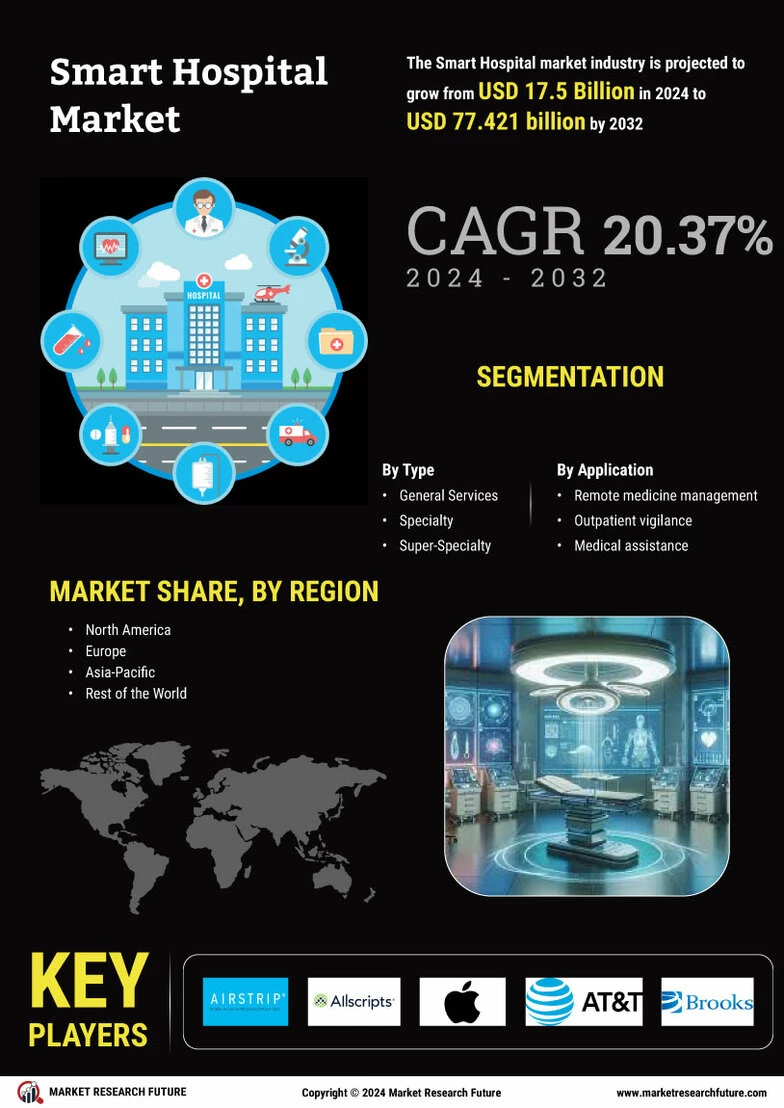Smart Hospital Market Trends: Transforming Healthcare Delivery
The Smart Hospital Market trends reflect a paradigm shift in healthcare delivery through digitalization and technology adoption. Hospitals are integrating AI-enabled diagnostic tools, IoT-connected monitoring systems, and robotics-assisted procedures to enhance patient care and operational efficiency. Trends indicate a growing emphasis on predictive healthcare, where continuous monitoring and data analysis help prevent complications and reduce readmissions. Furthermore, smart hospital trends showcase an increase in telemedicine services, remote patient monitoring, and connected healthcare ecosystems that streamline communication among healthcare professionals.
Get Full Reports:https://www.marketresearchfuture.com/reports/smart-hospital-market-4505
Market trends also highlight the importance of energy-efficient solutions, smart building infrastructure, and automated asset management in modern hospitals. Increasing investments in wearable health devices, cloud-based hospital management platforms, and patient engagement tools are reshaping the patient experience. By aligning with these trends, healthcare providers can optimize resources, improve patient safety, and achieve better clinical outcomes. The Smart Hospital Market trends provide a roadmap for technology adoption, innovation, and future expansion in the healthcare sector.
FAQs:
Q1: What are the major trends in the Smart Hospital Market?
A1: AI diagnostics, IoT devices, telemedicine, remote monitoring, and robotics-assisted care are major trends.
Q2: How do these trends impact healthcare delivery?
A2: They improve patient outcomes, operational efficiency, resource management, and reduce hospital readmissions.
Q3: Why is digitalization important for smart hospitals?
A3: It enables real-time monitoring, predictive care, data-driven decisions, and enhances the overall patient experience.
The Smart Hospital Market trends reflect a paradigm shift in healthcare delivery through digitalization and technology adoption. Hospitals are integrating AI-enabled diagnostic tools, IoT-connected monitoring systems, and robotics-assisted procedures to enhance patient care and operational efficiency. Trends indicate a growing emphasis on predictive healthcare, where continuous monitoring and data analysis help prevent complications and reduce readmissions. Furthermore, smart hospital trends showcase an increase in telemedicine services, remote patient monitoring, and connected healthcare ecosystems that streamline communication among healthcare professionals.
Get Full Reports:https://www.marketresearchfuture.com/reports/smart-hospital-market-4505
Market trends also highlight the importance of energy-efficient solutions, smart building infrastructure, and automated asset management in modern hospitals. Increasing investments in wearable health devices, cloud-based hospital management platforms, and patient engagement tools are reshaping the patient experience. By aligning with these trends, healthcare providers can optimize resources, improve patient safety, and achieve better clinical outcomes. The Smart Hospital Market trends provide a roadmap for technology adoption, innovation, and future expansion in the healthcare sector.
FAQs:
Q1: What are the major trends in the Smart Hospital Market?
A1: AI diagnostics, IoT devices, telemedicine, remote monitoring, and robotics-assisted care are major trends.
Q2: How do these trends impact healthcare delivery?
A2: They improve patient outcomes, operational efficiency, resource management, and reduce hospital readmissions.
Q3: Why is digitalization important for smart hospitals?
A3: It enables real-time monitoring, predictive care, data-driven decisions, and enhances the overall patient experience.
Smart Hospital Market Trends: Transforming Healthcare Delivery
The Smart Hospital Market trends reflect a paradigm shift in healthcare delivery through digitalization and technology adoption. Hospitals are integrating AI-enabled diagnostic tools, IoT-connected monitoring systems, and robotics-assisted procedures to enhance patient care and operational efficiency. Trends indicate a growing emphasis on predictive healthcare, where continuous monitoring and data analysis help prevent complications and reduce readmissions. Furthermore, smart hospital trends showcase an increase in telemedicine services, remote patient monitoring, and connected healthcare ecosystems that streamline communication among healthcare professionals.
Get Full Reports:https://www.marketresearchfuture.com/reports/smart-hospital-market-4505
Market trends also highlight the importance of energy-efficient solutions, smart building infrastructure, and automated asset management in modern hospitals. Increasing investments in wearable health devices, cloud-based hospital management platforms, and patient engagement tools are reshaping the patient experience. By aligning with these trends, healthcare providers can optimize resources, improve patient safety, and achieve better clinical outcomes. The Smart Hospital Market trends provide a roadmap for technology adoption, innovation, and future expansion in the healthcare sector.
FAQs:
Q1: What are the major trends in the Smart Hospital Market?
A1: AI diagnostics, IoT devices, telemedicine, remote monitoring, and robotics-assisted care are major trends.
Q2: How do these trends impact healthcare delivery?
A2: They improve patient outcomes, operational efficiency, resource management, and reduce hospital readmissions.
Q3: Why is digitalization important for smart hospitals?
A3: It enables real-time monitoring, predictive care, data-driven decisions, and enhances the overall patient experience.
0 Reacties
0 aandelen
81 Views
0 voorbeeld


